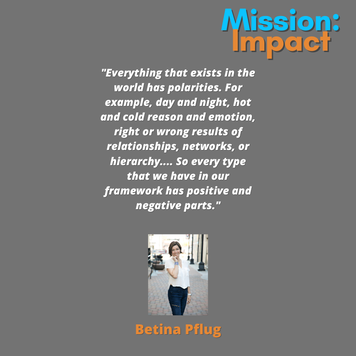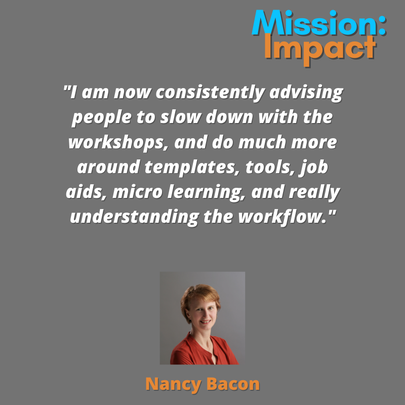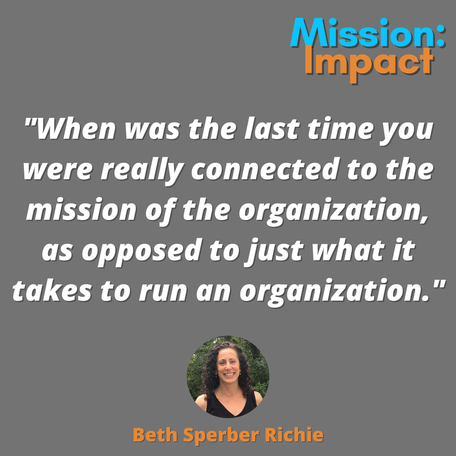Mission: Impact podcast & blog
Build a better world without becoming a martyr to your nonprofit cause
Listen on:
 In episode 57 of Mission: Impact, Carol and her guest, Betina Pflug (Beh-tee-nuh Flug) discuss:
Guest Bio: Betina Pflug is an executive and life coach with over 25 years of experience in entrepreneurship, relational intelligence, strategic decision-making, nonprofits, facilitation & training, marketing, and CRM. Her international experience enables her to share best practices from a different perspective and allows her to communicate in several languages, such as Portuguese, German, Spanish, and English. With a personal motto of "leave every place you go, better than you found" and her organizational skills, Betina identifies problems and dreams up actionable solutions. Important Links and Resources:
Click "Read More" for Transcript:  In episode 19 of Mission: Impact, some of the topics that Carol and her guest, Nancy Bacon discussed include:
Guest Information: Nancy Bacon is a teacher, instructional designer, and learning strategist who has worked for over 25 years in the nonprofit sector. She works with nonprofits, associations, and networks to strengthen how nonprofits are able to serve their communities. She has trained thousands of people in-person and online, speaks on learning and leadership, and writes books and blogs on topics at the intersection of learning and nonprofits. Nancy also co-hosts the Nonprofit Radio Show. Important Links:
 This week we’re talking to Beth Sperber Richie. We talked about: • What is burn out is and why burn out is so prevalent in the nonprofit sector • What the research shows about rest and productivity for organizations. • What vicarious trauma is and how it impacts nonprofit staff and an organization’s culture. Beth Sperber Richie, Ph.D. is a licensed psychologist and consultant in private practice in the Washington, D.C. area. Dr. Richie works with non-profit leaders on how to sustain their staff and their mission given the grind of social change work. She gives workshops and presentations on managing stress and burnout, vicarious trauma and compassion fatigue, improving cross-cultural communication and counseling skills and setting boundaries for front-line employees. Her workshops focus on practical skills and engaged involvement of all participants. Beth on LinkedIn Click "Read More" for Transcript:  Photo by Andrea Piacquadio from Pexels Photo by Andrea Piacquadio from Pexels One of the things that facilitators worry a lot when shifting from facilitating in the room to facilitating on line is not being able to “read the room.” But what if they've been “reading the room” inaccurately? Sometimes people's body language is super obvious yet most of the time in the nonprofit workplace it tends to be more subtle. Facilitators may have been engaging in mind reading when they think they are reading the “vibe” in the room yet they really did not know what the participants in the group were thinking and feeling. "Reading the room" onlineWhat if facilitating online actually meant you paid more attention to “reading the room”? How might you track it?
One of the tips for facilitating online is to check in more frequently with the group that you're working with. Here are four ways to think about monitoring progress. Getting connectedThe first is to make sure that you're establishing connections and setting expectations at the beginning of your meeting. What is some pre work that people could engage in so that they could do some thinking beforehand? How might you spend a few minutes to help people get to know each other a little better? How might you use a tool like OARR - Outcomes agenda roles and rules --to orient people as you start out? Signaling your turnsThe second category is making sure that you're helping people track your progress in your process. You might use polling to assess your engagement, understanding and effectiveness. You might do a quick “POP” check in on purpose, outcomes and process. You need to ”signal your turns” so that you are clear about when you're moving from one agenda item to another. Take a pause to make sure everyone is with you especially if you are moving from using one technology tool to another. You can also use visual tools to help you track progress Are we in agreement?A third category is checking for understanding or checking for consensus. You'll likely want to do this more often in an online meeting than you would in person. This means that you need to allow more time to achieve the outcomes then you might have normally budgeted in an in-person meeting. It's slowing down and questioning your assumptions. Taking the time to make your thought process more explicit. Some tools that you might use included a quick check in what's called a “fist to 5.” You ask people to make a show of hands/fingers where they are. You designate what the fist means and what 5 fingers mean. Let's say 5 fingers means high agreement or understanding. This can be used in lots different ways. Another is the gradients of agreement which helps breakdown what consensus looks like. I've described using this tool another post. Carol, how are you doing?The fourth way to approach monitoring group progress online is to check in with individuals. In some ways online platforms makes this easier than in person. When I am in front of a large room of people it's unlikely that I'm going to be able to see all their name tags. But on a Zoom call I can usually see at least a first name or some kind of identifier to ask people individually how they're doing. You will want to have some discussion around group norms about whether it’s ok to ask people who haven't talked much to chime in and share. This may depend on the where your group is in terms of its evolution and development. Getting helpYou could also share the job of paying attention to and monitor the group. You might have a co-host who's monitoring reactions and gallery view while you're focused on facilitating the meeting. You will want to come to agreement beforehand that they can interrupt you and ask questions of the group. Most important (this certainly is true in an in person as well but even more so online), do not assume that silence means consent. Or assume it means discontent.
Need to learn more about how to work with groups effectively online? Check out my program.  Photo by Dio Hasbi Saniskoro from Pexels Photo by Dio Hasbi Saniskoro from Pexels One of the keys to a high performing team according to Google research is a sense of psychological safety. When people think of a team that really worked together well, they often describe the respect they had for each other. Or how ideas were welcome and free flowing. Not about trust fallsBut how do you build that trust? A lot of people groan when they hear the word ‘team building’ and ask whether they are going to have to do trust falls or reveal uncomfortable things about themselves prematurely. One thing that you can do when a new project team starts is to spend some time coming up with agreements about how the group is going to work together. In my experience, it works better if the group comes up with their own set of agreements rather than just using a set of generic ground rules that the project manager declares. Creating agreementsHere is a simple exercise for creating those agreements. First ask each person in the group to pair up with a person and describe a time when they were on a team that worked really well. After each person has had a chance to talk about their story, have them think about what the characteristics were of the team. Words such as respect, dependability, open communication will likely emerge. The key is to not stop here. Ask the group what behaviors demonstrate each of these words to them. What does ‘respect’ look like? Otherwise ‘respect,’ ‘transparency,’ are big vague concepts. Each person has their own image of what these are and what are the actions and behaviors that encompass those concepts for them. It is too easy for groups to agree to these concepts without having gotten clear on what they are agreeing TO DO in order to make that happen. What does respect mean to you?When I have done this with teams, some of the most interesting conversations come around the concept of ‘respect.’ What demonstrates that to one person can be very different to another. For example, for one person respect may be embodies in not being interrupted. For another person, respect may be demonstrated by a lively debate (with interruptions). Without getting specific, the group assumes they are clear on expectations while they may actually be widely divergent.
Once you have agreed on the behaviors for each characteristic, you can then write up a set of agreements that the group pledges to aspire to. Having made this list explicit, makes it easier for team members to bring up issues in the future if they feel a team member is not following the agreements. It is also helpful to check in periodically and ask the group how they think they are doing on their agreements. What might need to shift to be better aligned with the agreements? Taking the step to get clear on what are the behaviors that will help the group do their best work is a concrete step toward building the psychological safety for that good work. Need help building trust on your team or within your organization? Reach out for a coaching call. |
Categories
All
Archives
July 2024

Grace Social Sector Consulting, LLC, owns the copyright in and to all content in and transcripts of the Mission: Impact podcast, as well as the Mission: Impact blog with all rights reserved, including right of publicity.
|
Telephone301-857-9335
|
info[at]gracesocialsector.com
|
Grace Social Sector Consulting, LLC, owns the copyright in and to all content in, including transcripts and audio of the Mission: Impact podcast and all content on this website, with all rights reserved, including right of publicity.
|